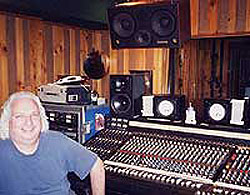
BB: So what’s the reason? It is technology, or MTV or just a different aesthetic in music today?
SY: I’m not sure. But I know one thing that doesn’t change. Guys who do what we do for a living, we are emotional salesmen.
At the end of the day, all we are doing is selling emotion. You can slice it or dice it and hold these pieces up to the light all you want, but it’s all the same thing.
It’s about the song, it’s about the performance, and it’s about getting that across to the listening public.
If as the recording engineer and mixer, if I can get that across to the listener, even being squeezed through MP3, even in a department store with the speakers twenty feet up, then my client wins.
That’s the theory I talk about to my clients. In a car, at sixty miles an hour, with the windows down and maybe the top down in a convertible, and you can’t really hear the bass and you can barely hear the words, but you still get the effect, you still get the feeling of that song.
Or the woman who is vacuuming in the bedroom and the radio is in the kitchen, over this noise you can get a little beat of the melody. So if you can get it across to them, then you can move them to go out and buy it.
So I think the only way that you can get records in people’s collection that they will listen to over and over is to get that feeling, that emotion, across the distance between the speakers and their ears.
BB: The next landmark of you career was working with John Lennon. Did you find that intimidating?
SY: Are you kidding? I had skid marks in my underwear, I had fudgey drawers! You know, here’s a guy who had been around the block several thousand times by then, and I could tell he know, he just simply knows.
So I’m hoping that I can give him what he needs. He’s used to working with George Martin, for God’s sake!
BB: He was producing, right?
SY: He was. So I wanted it to go smoothly. It was a very professional session, so you do your best to make everybody happy and come up with a sound that works. It turned out to be really terrific sessions.
BB: And that was at Record Plant?
SY: Yes, I was a staff engineer there at the time. I was there for ten years, from 1970 to 1980, though I did start some freelancing by 1978.
BB: Was that where you hooked up with Jimmy Lovine, there at Record Plant?
SY: Yes, he started out as my assistant. But he was sharp. It didn’t take him long to figure out there was no money in engineering, so he wanted to be a producer.
The first thing we did together was Patti Smith’s “Because the Night.” I mixed that with him. It turned out to be a big hit, so we figured we could have some success together.
“Why don’t we do more stuff?” he said, and he was seven years younger than me, just a kid 23 years old. He’s talking to me about going out and doing stuff, but I was thinking, “Hey, I get a paycheck here every week.”
I’m supposed to leave here and take a chance with this kid? So I did! (Laughs.) So we got this opportunity to do Tom Petty, and many more opportunities followed after that.
